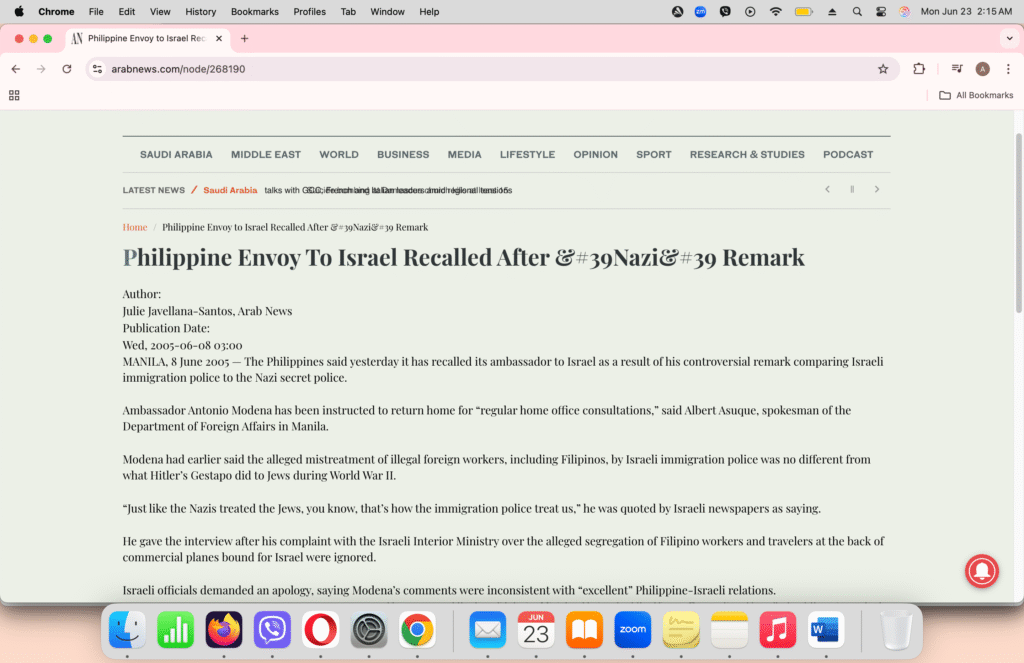Screenshot of 2005 Arab News article by Julie Javellana-Santos. Used for educational commentary. Source: arabnews.com
Author: Anica Angela Nicole Modena Hill
All rights reserved. No part of this publication may be copied, reproduced, reposted, or distributed in any format, physical or digital, without express written permission from the author. This work is protected under international copyright law and published exclusively by The Soft Protocol Company.
As I begin this work, I do so with full awareness of my rights under international human rights law, particularly the right to freedom of expression and the protection of personal and family honor. This is not merely a publication; it is a record of truth, justice, and security—both for myself and for every human being who seeks dignity under international law.
This story is grounded in justice. It is built upon the truth of how my grandfather, Ambassador Antonio Modena, served with courage in Tel Aviv, Israel, on behalf of the Filipino people. His efforts protected not just lives but laws, not just bodies but dignity. And because of this, I write in his honor, as his blood, his granddaughter, and a citizen committed to lawful memory. This is a story not of politics, but of protection, not of titles, but of truth.
He is not just a diplomat I studied—he is my lineage, my heritage, my blood. A man of incorruptible valor and deep dignity who carried the burden of an entire nation on his shoulders with an unwavering heart for the Filipino people. He served the Republic of the Philippines not for applause, but because it was right. I speak not only with pride but with moral clarity inherited from him. His bravery was not performed through arms or grand gestures, but through quiet resistance, legal mastery, and principled service. His courage saved lives, upheld international law, defended the dignity of the Filipino, and called the world to a higher standard of justice.
Chapter 1: A Journalist’s Integrity in a Diplomat’s Body
Before entering the halls of international diplomacy, Antonio Modena was a journalist. He knew how to ask questions, and more importantly, he knew when not to stay silent. Appointed as the Philippine Ambassador to Israel, he entered a foreign land not only with credentials but with conviction.
He witnessed the degrading treatment of Filipino migrant workers at Ben Gurion Airport, segregated lines, confiscated phones, and harsh interrogations. He did not stay silent. He invoked the Vienna Convention on Consular Relations (1963), a binding treaty that ensures foreign nationals’ rights to consular assistance.
When others accepted the abuse as routine, he wrote letters, filed reports, and held the Israeli Interior Ministry accountable. He summoned the Israeli Interior Ministry. He invoked the Vienna Convention. He called out the misconduct for what it was: a violation of human dignity and international law. Even when accused of being dramatic or offensive, he stood firm. And eventually, policy changed.
Chapter 2: Defender of the Invisible
To be an OFW in Israel then was to live with fear at every checkpoint, at job sites, at night. Ambassador Modena recognized the psychological toll of injustice and moved swiftly. He created systems of emergency response, including embassy hotlines and text alerts. When a bombing occurred in Haifa, it was his office that coordinated safety protocols for Southeast Asians and Filipinos. Under his watch, the Philippine Embassy became a refuge, not just a bureaucracy. He reminded both governments that international labor must be protected under conventions like the International Labour Organization’s Migration for Employment Convention (Revised), 1949 (No. 97).
His compassion was not charity. It was law-informed justice. He visited churches, shelters, and embassy gatherings. He became a name whispered in prayers of relief.
Chapter 3: The Fight for Historical Truth
During World War II, the Philippines opened its doors to Jewish refugees fleeing the Holocaust. It was Ambassador Antonio “Tony” Modena who reignited talks at Yad Vashem, Israel’s official memorial to Holocaust victims, reminding them that during WWII, the Philippines was one of the few nations that offered refuge to Jews. He advocated for a permanent display of this fact, not for credit, but for clarity. To permanently display this truth.
He understood that memory is a moral obligation, a legacy of light.
Chapter 4: The Apology That Echoed
In one public incident, he compared immigration practices at the time to those of the Nazi-era Gestapo—a remark that caused diplomatic tension. But instead of withdrawing, he apologized with grace while doubling down on the point: treatment of Filipinos must not border on harassment, regardless of context.
That moment was not weakness. It was strength wrapped in humility. A rare type of courage only real diplomats possess.
Ambassador Antonio Modena did not make headlines every day. He did something harder: he made a quiet change. He protected Filipino dignity with the pen, the flag, and the law. He did not back down in silence—he backed up with justice.
He served not only the Republic, but his people. He reaffirms the human rights of the Filipino people. His reference may have been harsh, but his motive was righteous. With a brave heart and a sharp mind, he made diplomacy a tool of defense for those who had none.
This is his legacy. This is our memory. He knew that diplomacy required both humility and truth, and he showed both.
What Legacy Looks Like
Ambassador Antonio Modena did not crave medals or media. He pursued justice. He made a quiet change—redefining what it means to be a public servant, a patriot, and a human being.
He used the tools of international law, the principles of journalism, and the passion of a true Filipino heart to change lives. To me, he is not only history—he is blood. He is the truth. He is proof that one voice, used correctly, can shield thousands.
Legal References & Citations:
- Vienna Convention on Consular Relations (1963), United Nations
- ILO Convention No. 97 (Migration for Employment Convention, Revised, 1949)
- United Nations Basic Principles and Guidelines on the Right to a Remedy and Reparation (2005)
- Historical references: Yad Vashem Memorial (Israel); WWII Philippine efforts for Jewish refugee rescue
- Universal Declaration of Human Rights (1948), Article 19: Freedom of Opinion and Expression
- International Covenant on Civil and Political Rights (ICCPR), Articles 17 and 19
This book is protected under the Berne Convention for the Protection of Literary and Artistic Works and all international laws applicable to intellectual property. Reproduction, adaptation, or quotation in any form without written consent is prohibited. Officially authored and published under The Soft Protocol Company.
© 2025 Anica Angela Nicole Modena Hill
